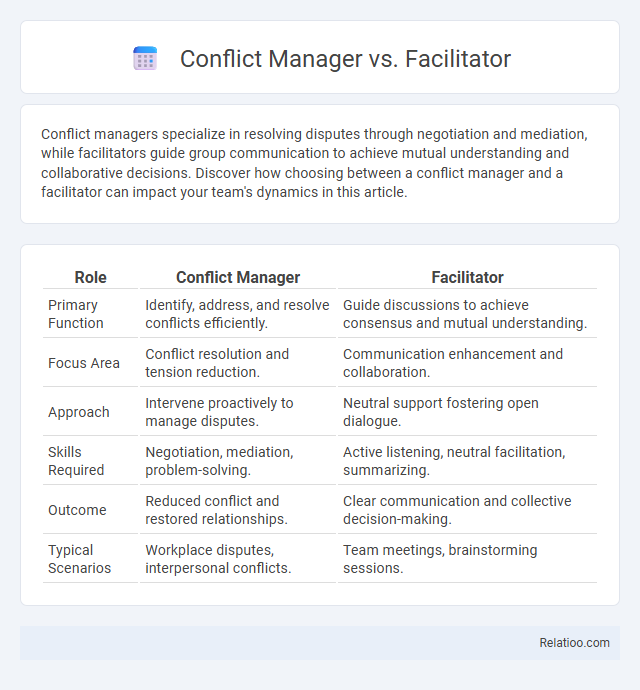Conflict managers specialize in resolving disputes through negotiation and mediation, while facilitators guide group communication to achieve mutual understanding and collaborative decisions. Discover how choosing between a conflict manager and a facilitator can impact your team's dynamics in this article.
Table of Comparison
| Role | Conflict Manager | Facilitator |
|---|---|---|
| Primary Function | Identify, address, and resolve conflicts efficiently. | Guide discussions to achieve consensus and mutual understanding. |
| Focus Area | Conflict resolution and tension reduction. | Communication enhancement and collaboration. |
| Approach | Intervene proactively to manage disputes. | Neutral support fostering open dialogue. |
| Skills Required | Negotiation, mediation, problem-solving. | Active listening, neutral facilitation, summarizing. |
| Outcome | Reduced conflict and restored relationships. | Clear communication and collective decision-making. |
| Typical Scenarios | Workplace disputes, interpersonal conflicts. | Team meetings, brainstorming sessions. |
Introduction to Conflict Managers and Facilitators
Conflict managers specialize in identifying, addressing, and resolving disputes through strategic interventions aimed at minimizing negative outcomes and promoting constructive dialogue. Facilitators guide group discussions by creating a neutral environment that encourages open communication, collaboration, and consensus-building without directly managing the conflict itself. Both roles are essential in organizational settings, with conflict managers focusing on conflict resolution processes and facilitators emphasizing process management to enhance group dynamics.
Defining the Roles: Conflict Manager vs Facilitator
Conflict managers are responsible for identifying, addressing, and resolving disputes within an organization, often using structured strategies to mitigate tension and promote a healthy work environment. Facilitators focus on guiding group discussions and improving communication, enabling participants to collaborate effectively and reach consensus without directly intervening in the conflict. Understanding the distinction between these roles helps you select the appropriate approach for managing interpersonal or team conflicts based on whether resolution or communication enhancement is the primary goal.
Core Duties and Responsibilities
Conflict managers primarily analyze, mediate, and resolve disputes within organizations by implementing conflict resolution strategies and ensuring effective communication between parties. Facilitators guide group discussions and decision-making processes, promoting collaboration and consensus without directly managing conflict outcomes. Conflict managers combine mediation with proactive conflict prevention, focusing on relationship management, policy development, and training to create a positive organizational climate.
Skills Required for Each Role
Conflict Managers require advanced negotiation skills, emotional intelligence, and the ability to remain impartial while resolving disputes. Facilitators need strong communication abilities, active listening, and the capacity to guide group discussions toward collaborative decision-making. Conflict coaches combine conflict resolution strategies with personalized support, demanding empathy, analytical thinking, and tailored problem-solving expertise.
Approaches to Resolving Conflict
Conflict managers focus on controlling and mitigating disputes through structured intervention strategies that prioritize maintaining order and resolving issues efficiently. Facilitators emphasize open communication and collaboration, guiding parties to understand each other's perspectives and reach mutually beneficial solutions. Your choice between a conflict manager and facilitator should consider whether you need authoritative resolution or cooperative dialogue to address the conflict effectively.
Techniques Utilized in Conflict Management and Facilitation
Conflict managers primarily utilize negotiation, mediation, and problem-solving techniques to address disputes and find mutually acceptable solutions. Facilitators focus on promoting open communication, active listening, and consensus-building strategies to guide group discussions and resolve conflicts collaboratively. Both roles emphasize emotional intelligence and impartiality, but conflict managers often take a more directive approach, while facilitators create a neutral environment to encourage participant-driven outcomes.
When to Choose a Conflict Manager or Facilitator
Choose a conflict manager when disputes involve high-stakes issues requiring authoritative decision-making or structured resolution processes to enforce agreements. Opt for a facilitator if the goal is to guide open dialogue, foster mutual understanding, and encourage collaborative problem-solving among your team members. Understanding your organization's dynamics and conflict intensity ensures selecting the appropriate role for effective conflict resolution.
Key Differences in Outcomes and Impact
Conflict managers actively intervene to resolve disputes by imposing solutions or guiding parties towards compromise, resulting in more structured, authoritative outcomes that emphasize resolution speed and enforceability. Facilitators focus on guiding open communication and understanding between conflicting parties without imposing solutions, fostering collaborative problem-solving and mutual agreement that enhances relationships and long-term cooperation. Conflict managers often prioritize conflict control and organizational stability, while facilitators aim to build consensus and empower participants, leading to significantly different impacts on team dynamics and conflict sustainability.
Common Challenges and Solutions
Conflict managers and facilitators both address disputes but differ in approach and scope, with conflict managers often taking a more authoritative role while facilitators guide dialogue impartially. Common challenges include managing emotional responses, overcoming communication barriers, and ensuring all parties feel heard, which can impede resolution if not handled effectively. Your best solution involves selecting the appropriate role based on context, employing active listening, and establishing clear ground rules to foster mutual understanding and collaboration.
Conclusion: Selecting the Right Professional for Your Needs
Choosing the right professional depends on the context and desired outcomes: Conflict Managers actively intervene to resolve disputes through negotiation and problem-solving techniques, while Facilitators guide discussions to foster collaboration without imposing solutions. Understanding the specific role and approach of each--whether managing conflict dynamics directly or enabling productive communication--ensures effective conflict resolution tailored to organizational or interpersonal needs. Selecting between a Conflict Manager and a Facilitator requires assessing whether a directive resolution or a consensual dialogue process best suits the situation.

Infographic: Conflict Manager vs Facilitator
 relatioo.com
relatioo.com